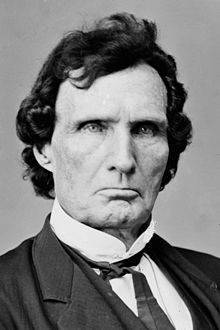
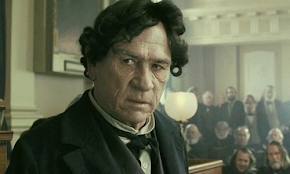 Top: Thaddeus Stevens. Bottom: Tommy Lee Jones as Thaddeus Stevens in the film “Lincoln.”
Top: Thaddeus Stevens. Bottom: Tommy Lee Jones as Thaddeus Stevens in the film “Lincoln.”
By William Loren Katz
I’m rooting for Tommy Lee Jones to win an Oscar for his riveting performance as Congressman Thaddeus Stevens in Lincoln. Full disclosure: As a historian my hope is this might focus important attention on Stevens. This flamboyant congressman (and his lashing tongue) had gained enormous name recognition in his time, but it was not the kind a mother wants for her famous son.
Until the modern Civil Rights Movement those who wrote U.S. history took a stick to Stevens. But he didn’t care. By the time he died in 1868 he had earned the appreciation of millions of slaves he helped free, and further admiration as “the father of the 13th, 14th, and 15th Amendments.” But until Tommy Lee Jones donned the man’s grim look, sharp wit, bulky swagger, and advanced racial views, Stevens faced a thrashing in classrooms, textbooks, and movies.
In 1915, Hollywood’s first blockbuster, Birth of a Nation, sought to humiliate Stevens — barely disguised as “Congressman Austin Stoneman.” Never has the media so venomously portrayed a U.S. elected official. The film has Stevens ruining the South by elevating ignorant former slaves to high office. This in turn, the script continues, encourages African American officials (played by white actors in black face) to rape white women. In the final scenes the Ku Klux Klan rides in to save white womanhood and Christian civilization. Half a century after his death, the movie was still beating the congressman. Its scenes also bury the fact that the South’s real rapists during and after slavery were planters who held whips and guns as well as public office.
To make its tale believable, Birth of a Nation was given a documentary look and the stamp of historical truth. It also carried the endorsement of President Woodrow Wilson, who called it “history written in lightning.” For decades millions of men, women, and children learned to hate black people and cheer the KKK. It took an NAACP national protest to remove a scene showing Klansmen castrating a black man.
Stevens fared marginally better in Tennessee Johnson, where the famous Lionel Barrymore portrayed a malicious politician plotting to destroy the South and white supremacy. Then a heroic President Andrew Johnson (Van Heflin) restores “home rule.” [Note: This was during the war against Nazi racism.] Between the 1915 silent epic and the 1942 feature, our leading scholars amplified this message. Echoing his profession’s view, Pulitzer Prize-winning historian James Truslow Adams called Stevens “perhaps the most despicable, malevolent, and morally deformed character who has risen to high power in America.”
It is true that Thaddeus Stevens unleashed nasty, hateful invective on slaveholders, ridiculed incompetents, and relentlessly elbowed a cautious Lincoln toward emancipation. In 1861 Lincoln was not “The Great Emancipator” but the man who entered the White House supporting an amendment (the original “13th”) to make slavery permanent. As president he steadfastly refused to propose emancipation for his first 17 months. When he first announced his Proclamation, it was a statement he planned to issue a formal declaration on January 1, 1863. Stevens, other abolitionists, and people of color were worried — given the president’s fondness for compromise — there might be a slip from the cup to the lip.
Stevens beat a very different path: “There can be no fanatics in defense of genuine liberty.” He did not shrink from hazardous combat against the Fugitive Slave Law and defiantly turned his law office into an Underground Railroad station. When a band of armed slave runaways in nearby Christiana opened fire on a slaveholder posse led by a U.S. marshal, Pennsylvania’s most famous attorney volunteered as their defense attorney and won acquittal for the arrested. Even Stevens’ bristling attacks on slaveholders in Congress came with some risk. Twice on the House floor he had to fend off Bowie knife-wielding colleagues. Congressman Preston Brooks used his cane to beat Stevens’ colleague Senator Charles Sumner senseless as he sat at his desk.
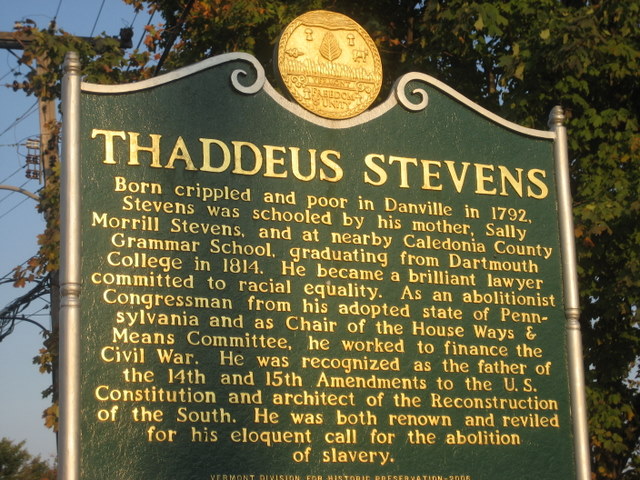
The historical marker in Vermont for Thaddeus Stevens. Photo by The Danville Historical Society — danvillevthistorical.org.
In 1792 Thaddeus Stevens was born into adversity in Vermont. His father Joshua was an alcoholic shoemaker unable to hold a job so the family had to struggle. Then when Joshua disappeared never to return, his mother Sally had to pick up the pieces. Resourceful, energetic, and determined to see her four boys educated, she paid family bills through long, grueling work as a maid and housekeeper.
Thaddeus stepped into life with a clubfoot when society saw this as a Devil’s curse, a sign of mental depravity. From an early age he had to deal with those who derided him. He learned to think for himself, stick to his guns. Dealing with irrational hate may have opened his heart to others society classified as lesser humans.
Stevens graduated with a law degree from Dartmouth College, and opened a law office in Gettysburg, Pennsylvania. His fortunes changed when he bought a Pennsylvania ironworks and a forge, and invested in land. He was elected to the state senate where he championed public education. Angry, the legislature voted down an education bill because it raised taxes to aid poor families. Stevens charged into the fight. Legislators listened as he argued “the blessing of education shall be conferred on every son of Pennsylvania, shall be carried home to the poorest child of the poorest inhabitant of the meanest hut of your mountains, so that even he may be prepared to act well his part in this land of freedom, and lay on earth a broad and solid foundation for that enduring knowledge which goes on increasing through increasing eternity.“ His speech led to passage of the state’s education law and made him “the father of public education” in Pennsylvania.
In 1848 Stevens was elected to Congress raring to fight the “slaveocracy’s” grip on the country. He was also turning to issues of economic injustice. In 1852 he opposed employers who sought to “get cheap labor” by lowering American workers’ wages to European levels, and by using underpaid women laborers. Such efforts, he insisted, keep “the laboring classes [with] scarcely enough to feed and clothe them . . . [and] nothing to bestow on the education of their children.”
In 1853 Stevens returned to a law office in Lancaster to pay business debts of more than $250,000. In 1859 he returned to Congress as a Republican. When it was hardly popular to do so, he denounced bigotry, spoke in defense of Native Americans, Jews, Mormons, Chinese, and women’s rights, and intensified his crusade against slavery.
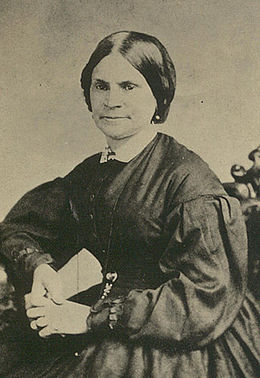
Lydia Hamilton Smith
Stevens had never married and since 1848 shared his large Lancaster home with Lydia Hamilton Smith, an African American, and her two sons from a previous marriage. While he and Mrs. Smith treated their relationship as a common law marriage, his foes saw coarse degeneracy. He refused to publicly explain what he considered a private matter. His will left Mrs. Smith enough money to purchase the family home and live in comfort. In Birth of a Nation, Mrs. Smith, played by a pudgy white actor, greets news of Lincoln’s assassination with a dance and shout, “You are now the most powerful in the United States.”
Despite his differences with the new president, Stevens forged a respectful alliance with the politician he came to call “the purest man in America.” As chairman of the House Ways and Means Committee that controlled the war’s finances, Stevens was the most powerful member of the House. Lincoln held the power to make emancipation permanent. The two needed each other. In the 2012 movie Lincoln, Stevens is cast as the radical whom Lincoln must tame to ensure passage of the 13th Amendment. This is Hollywood drama. The ardent abolitionist was as cagey a politician as Lincoln, and needed no persuasion to support his life’s goal.
Fawn Brodie, Stevens’ admiring biographer, calls him “the scourge of the South.” But Stevens’ harsh, lacerating tongue landed on congressional incompetents as well as pro-slavery Southerners and Northerners. He could reduce political foes to gibbering self-doubt.
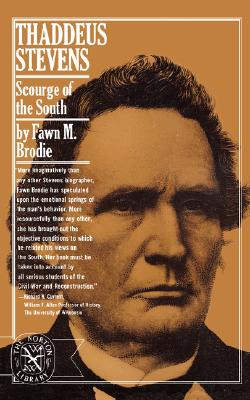 During the pivotal Gettysburg campaign in 1863, one Confederate officer set out to kill him. Confederate Major General Jubal Early detoured his Army of Northern Virginia from Gettysburg to Stevens’ ironworks at today’s Caledonia State Park. Unable to find him to “hang him on the spot and divide his bones,” Early ordered his men to burn everything, and steal his horses, mules, grain, and iron bars. Stevens had to borrow money to rebuild.
During the pivotal Gettysburg campaign in 1863, one Confederate officer set out to kill him. Confederate Major General Jubal Early detoured his Army of Northern Virginia from Gettysburg to Stevens’ ironworks at today’s Caledonia State Park. Unable to find him to “hang him on the spot and divide his bones,” Early ordered his men to burn everything, and steal his horses, mules, grain, and iron bars. Stevens had to borrow money to rebuild.
Stevens greeted Lincoln’s Emancipation Proclamation as an invitation “to write a page in the history of the world whose brightness shall eclipse all the records of heroes and of sages.” Now “this Republic . . . [could] become immortal.” The two now marched down the same road, Stevens, as to be expected, at a quicker pace.
As the war’s casualties passed half a million and its cost rose to $4 billion, Stevens’ concern turned to those who bore the greatest burdens — “the poor widow, the suffering soldier, the wounded martyr to his country’s good.” He denounced the new draft law that allowed a rich man to hire a substitute for $300 — and led to four days of rioting among the poor in New York City. As real wages fell and business profits rose, he denounced bankers and “war profiteers.” In vain he and his committee tried to prevent Northern manufacturers from selling the government useless rifles and damaged goods at inflated prices. He wished “no injury to any, but if any must lose, let it not be the soldier, the mechanic, the laborer, and the farmer.”
Stevens explored new directions. He welcomed the liberation of Russia’s serfs as a step toward world freedom. He encouraged a women’s delegation to accelerate their drive for suffrage. When Napoleon III of France made Emperor Maximilian his puppet ruler of Mexico, Stevens urged Congress to aid and provide loans to Mexico’s Indian President Benito Juarez.
As he grew older his friends called Stevens “The Great Commoner.” He asked to be remembered as one who tried “to ameliorate the condition of the poor, the lowly, the downtrodden of every race and language and color.” He said, “I have done what I deemed best for humanity. It is easy to protect the interests of the rich and powerful. But it is a great labor to protect the interests of the poor and downtrodden.” His enemies said he betrayed his country and his race, and sometimes his class.
For Stevens and the United States everything changed when the assassination of President Lincoln brought Andrew Johnson to the White House. A poor white, scornful of African Americans, he envied and worked to help the South’s planter class. While Stevens planned “a radical reorganization in Southern institutions, habits, and manners,” Johnson moved to aid planters to regain control of state governments and their former slaves. Stevens also faced a Republican party increasingly dominated by business interests, men who valued trade relations with the South’s wealthy far more than the new constitutional amendments.
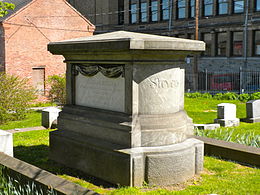
Stevens chose to be buried in the Shreiner-Concord Cemetery, because it was the only cemetery that would accept people without regard to race.
Despite his untiring efforts, Stevens failed to bring justice, equality, and a fairer distribution of land and power to the South. But before his death, Lincoln had been persuaded to argue black soldiers and other educated males of color should be granted the vote. But, yes, Stevens can be faulted for believing he could overcome his foes — economic and political influence and for seriously underestimating racism’s grip nationwide. His goal was to have the Southern white and black poor owning land, attending school, voting, and having equal rights and justice. These hopes were punctured within a few years of his death. His dream for the South would have to wait more than another century, and other, younger crusaders.
In death, Congressman Stevens’ life’s goals were affirmed. His coffin was carried to the Capitol by an honor guard of five African American and three white soldiers. He had asked to be buried in the one Lancaster cemetery open to all races. His gravestone bore his own epitaph: “I repose in this quiet and secluded spot not from any natural preference for solitude, but finding other cemeteries limited as to race by charter rules, I have chosen this that I might illustrate in my death the principles which I advocated through a long life: equality of man before his Creator.”
—William Loren Katz is the author of Black Indians: A Hidden Heritage, and 40 other books on African American history. His website is: www.williamlkatz.com.

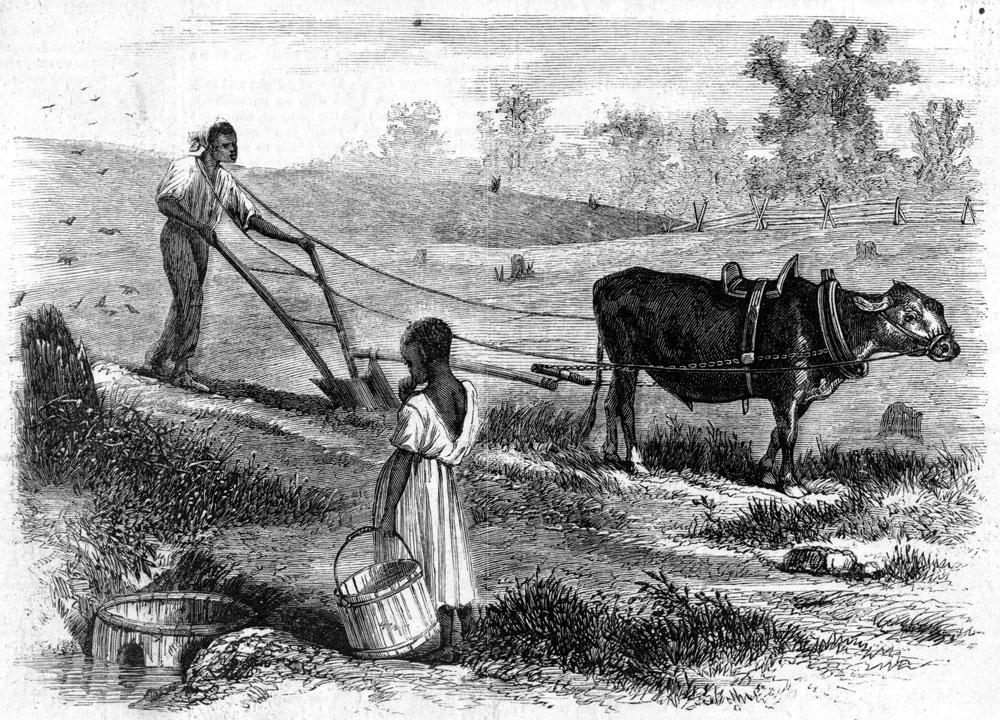








Wow! What an informative article this is. I had no idea. Of course, I grew up in Louisiana and never saw Birth of a Nation. I am slavering to see this movie by the great actor Tommy Lee Jones.